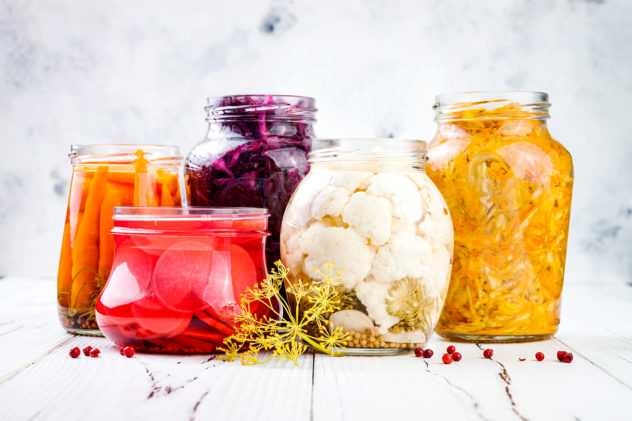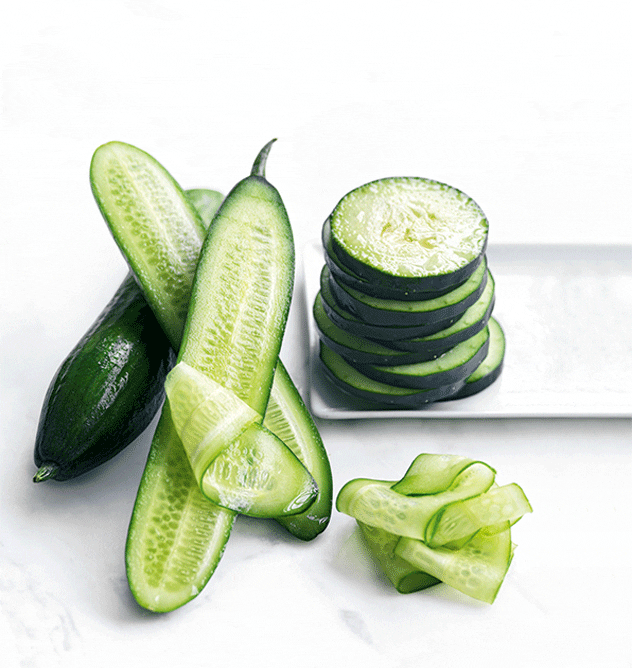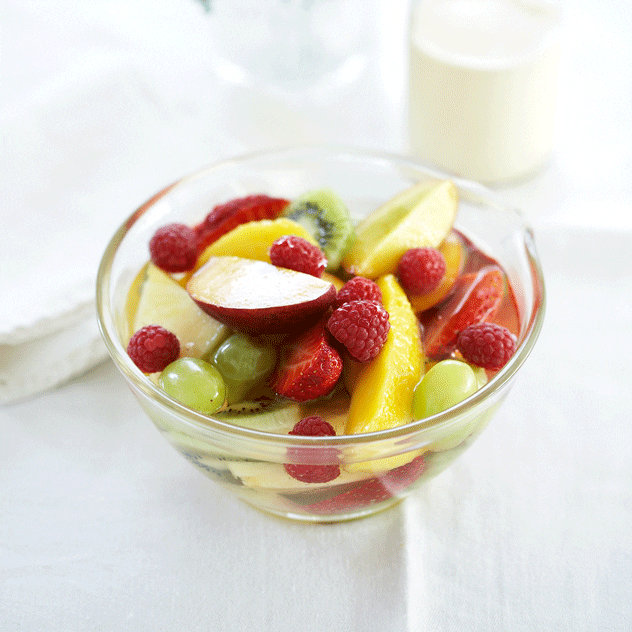How can I feel less bloated?
Feeling bloated is an annoyance we could all do without.
It can make us feel sluggish and irritable. It affects our mood. It affects our efficiency at work, our memory, our general comfort. The list goes on.
So how can we avoid these symptoms and, more importantly, prevent what causes them?
Often caused by natural processes during digestion, bloating is typically triggered by the accumulation of fluid or production of gas in the body.

1. Focus on probiotics
Probiotics are the live microorganisms found in bacteria, fungi or yeast. Probiotics are integral to maintaining your gastrointestinal tract and promoting overall gut health.
Here are five easy ways to add more probiotics to your diet.
Sauerkraut
Sauerkraut is a crunchy, sour and healthy condiment made entirely from cabbage and salt via the process of lactic acid fermentation and the aid of kindly bacteria. Not only are these bacteria good for your gut and immune system, sauerkraut is heaving with vitamins and minerals.
Click here for 3 different sauerkraut recipes.
Kombucha
Kombucha is a delicious and refreshing way to promote gut health and support the growth of probiotics. If you are buying store-bought varieties than look out for the sugar content. A lot of the new formulations contain high amounts of sugar with different flavours. Once you purchase a SCOBY (Symbiotic Colony of Bacteria) it is quite simple to make at home.
Kvass
Kvass, like sauerkraut, is naturally fermented. The juice that is made from fermenting vegetables – such as beetroot, is rich in probiotics, promotes great gut health, alkalises the blood and aids in digestion and liver health.
Recipe for Sweet & Sour Beetroots here.
Kefir
For those who aren’t dairy-intolerant, incorporating a daily dose of fermented dairy can be incredibly beneficial.
Sometimes referred to as ‘cultured dairy’, fermented dairy contains powerful probiotics and enzymes which can aid in healing our gut.
Kefir in particular has around 30 strains of bacteria and yeasts which makes it a particularly rich and diverse probiotic source.
Sour Pickles
When looking for pickles in the store, read the ingredient list. The most beneficial pickles will come from a natural fermentation – that is, with a salt and water mixture as opposed to vinegar. Pickles are a fantastic way to aid digestion, increase good gut bacteria and promote probiotic activity.
2. Foods to take

The occasional bloat can be reduced through some wise food choices and lifestyle changes. To fight the uncomfortable fullness, try these bloat-blocking foods:
- Bananas – high sodium intake could be causing your bloating. Hiding in most of today’s processed foods, sodium attracts and retains water in the body. Potassium on the other hand, can help counter sodium’s role. Maintaining your overall potassium-sodium level is important for water balance, so try adding since banana to breakfast for some balance.
- Cucumber – the high water and low-fibre content of cucumbers can cause increased urination, which in turn, beats the bloat and flattens the tummy.
- Ginger – ginger contains a digestive enzyme called zingibain, which helps the body break down protein. It also has anti-inflammatory and antibacterial properties which works on the bloat. Sipping on ginger tea after a meal will help you body to stimulate saliva and gastric juices that aid digestion.
- Fennel – fennel acts as a diuretic, helping out flush out the excess water in you body that’s causing you to feel bloated. Plus, fennel seeds contain essential oils that help with the digestion of nutrients.
3. Foods to avoid

As ScienceDirect reports, cruciferous vegetables, in particular, are known for causing bloating due to containing the complex sugar raffinose.
Raffinose is unable to be digested in the intestinal tract, causing it to remain inside until the gut’s bacteria is able to ferment it. While it remains undigested, it can cause bloating, flatulence and constipation.
While vegetables to consume the many nutrients they carry is vital to maintaining a healthy diet, you might want to avoid eating these six if you’re planning on going out.
- Broccoli
- Kale
- Radish
- Cabbage
- Cauliflower
- Rocket
4. Reduce water retention
Water retention happens when excess water builds up in the body’s circulatory system, tissue and body cavities. Sometimes this extra water is due to food intolerances, allergies, lack of protein or lack of vitamins, but more often than not it’s due to your menstrual cycle. Remember the terrible feeling of being bloated before a period? Well, you can now blame water retention for that.
Another common cause of water retention is alcohol consumption. Because alcohol is a diuretic, meaning that it causes you to need to pee more when you’re drinking, it will later retain fluid to try and make up for all the liquid lost.
It isn’t all bad, though. Figuring out whether you’re carrying a little extra water weight can be pretty easy, and getting rid of isn’t that hard either. Simply pinch the back of your heel and if it feels soft and spongy, it is likely your body is storing a little extra fluid. Here’s how to get rid of it:
Drink MORE water

It may seem a little strange as what you’re trying to get rid of is in fact water. But drinking water will both keep you hydrated and flush out any excess fluid
Eat diuretic foods

Watermelon, cucumber, lemon juice in water and cranberry juice are all good options when it comes to diuretic foods. Try to avoid caffeinated drinks as although they are diuretic, they can end up dehydrating you, potentially causing you to retain more fluid!
Basically, just make healthy food choices and drink lots of water, especially during and after alcohol. Doing this should make fluids behave themselves. Otherwise, if in doubt, chow down on a cucumber.
5. Keep your liver healthy

To help your liver work as it should try the following strategies:
Hydrate – provide your liver with the fluid it needs to effectively eliminate and detoxify. Avoiding further dehydration by reducing tea and coffee intake to no more than 2-3 cups per day.
Avoid Alcohol – as we talked about with water retention, alcohol is a direct toxin to the liver and so excessive intake can lead to liver cell damage. Do stick to safe limits, which is one standard drink for women on no more than five days per week or two standard drinks for men.
Reduce Toxic Fats – trans fats found in processed and packaged foods as well as excessive intake of saturated fats found in animal products such as fatty cuts of meat can overwhelm the liver’s ability to deal with these and can contribute to fatty liver disease, which is where the liver becomes ‘clogged’ with excess fatty tissue making it less efficient.
Reduce Sugar – fructose found in table sugar as well as fruit can overwhelm the liver also if eaten in excess. The result can be fatty liver disease, as well as insulin resistance whereby your body becomes less able to handle and process dietary sugars. Limit processed founds as these often have hidden sugars as well s fruit to no more than two pieces per day.
Avoid Paracetamol – this drug is often taken in excess and for too long which can damage the liver. Stick to no more than 4 grams per day (usually equivalent to 8 capsules or tablets) for no more than three days consecutively.
Stay Regular – a healthy liver requires a healthy digestive system as the two are linked. Staying regular and avoiding constipation is key. Try increasing your fibre intake slowly to avoid bloating. If you have digestive troubles you could try taking a good quality probiotic.







